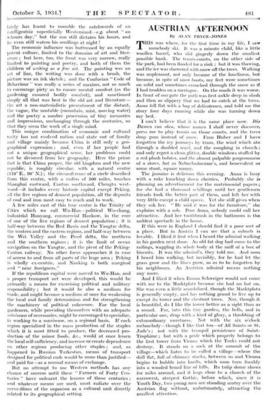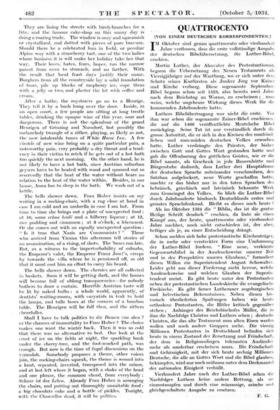AUSTRIAN AFTERNOON
By ALAN PRYCE-JONES THIS was where, for the first time in my life, I saw somebody ski. It was a minute child, like a little woollen barrel, who slid gingerly down the smallest possible bank. The tennis-courts, on the other side of the park, had been flooded for a rink ; but it was thawing, and the.ice was showered with snow off the trees. Walking was unpleasant, not only because of the loneliness, but because, in spite of snow-boots,. my feet were sometimes on solid and sometimes crunched through the snow as if I had trodden on a meringue. On the roads it was worse. In front of our gate the path was first ankle deep in slush and then so slippery that we had to catch at the trees. Anna fell flat with a bag of delicatessen, and told me the story four days running while she was turning down my bed.
I can't believe that it is the same place now. Die Damen von oben, whose names I shall never discover, press me to play tennis on those courts, and the trees drop gum instead of snow. Frau Huber and I have forgotten the icy journeys by tram, the wind which ate through a doubled scarf, and the coughing in church ; and only regret a clean glitter, double windows stuffed by a red plush bolster, and the almost palpable gorgeousness of a stove, hot as Nebuchadnezzar's, and benevolent as some stout, square nanny.
The jasmine is delicious this evening. Anna is busy with a rake knocking down cherries. Probably she is planning an advertisement for the matrimonial papers ; for she had a thousand schillings until her gentlemen friends took the better part of them, and left her with very little except a child apiece. Yet she still gives when they ask her. " He said it was for the furniture," she explains with a sob. Poor Anna, nobody could call her attractive. And her toothbrush in the bathroom is the saddest spectacle in the house.
If this were in England I should, find it a poor sort of a place. But in Austria I can see that a suburb is lovable. I liked it first when I heard the admiral walking in his garden next door. An old fat dog had come to the railings, waggling its whole body at the sniff of a box of biscuits. It was the admiral's, they told me. And soon I heard him walking, but invisibly, for he had let the grass grow and the lilacs grow, so as to be forgotten by his neighbours. An Austrian admiral means nothing any more.
And I liked it when Emma Schweiger would not come with me to the Marktplatz because she had no hat on. She was even a little scandalized, though the Marktplatz is generally empty, and has nothing grand to live up to except its tower and the chestnut trees. Nor, though it is beautiful, do I like the tower better as a sight than as a sound. For, into this tiny garden, the bells, and in particular one, drop with a kind of glory, a throbbing of Not with tile six o'clock extraordinary sweetness.
melancholy—though I like that too—of All Saints or St. Jude's ; not with the tranquil persistence of Saint- Trophime ; but with a pride which properly belongs to the first tower from Vienna which the Turks could not destroy. It stands on a rock at the summit of the village—which hates to be called a village—where the dull flat, full of chimney stacks, between us and Vienna begins to bubble into knolls, which soon turn frankly into a wooded broad line of hills. Its tulip dome shows for miles around, and it hugs close to a church . of the narrowest, steepest Gothic, before which, since it is Youth Day, two young men are standing sentry over the Austrian flag without, unfortunately, attracting the smallest attention. They are lining the streets with birch-branches for a fete, and the famous cake-shop on- this sunny day is- doing a roaring trade. The window is oozy and squeamish or crystallized, and 'dotted with pieces of pure bravura. Should there be a celebrated bun in Ischl, or peculiar Alpine way with a strawberry tart, one of the two ladies whose business it is will make her holiday take her that way. Their loves, hates, fears,. hopes, run the narrow gamut from oven to stomach; and no farther. With the result that local feast days justify their name. Burghers from all the countryside lay a solid foundation of buns, pile up blocks of raspberry ice, cope them With a jelly or two, and plaster the lot with coffee and cream.
After a bathe, the roysterers go on to a Heurige. They tell it by a bush hung over the door. Inside, .in an open court,- a few people are sitting at long trestle tables, drinking the opaque wine of this year, sour and dangerous. There is not the-. splendour of the grand Heurigen of Grinzing and Nussdorf, but possibly the melancholy twangle of a zither, playing, as likely as not, the now intolerable tunes of White Horse Inn. A few viertels of new wine bring on a quite particular pain, a noteworthy pain, very probably a dry throat and a tend- ency in their victim to retch if he gets out of a hot bath too quickly the next morning. On the other hand, he is not likely to have a hot bath, since Austrian suburban geysers have to be heated with wood and spooned out so reservedly that the heat of the water without bears no relation to the heat of the water within. Besides, in our house, Anna has to sleep in the bath. We wash out of a kettle.
The bells shower down. Frau Huber insists on my writing in a rocking-chair, with a rug close at hand in case I am cold and an umbrella in case I am hot. From time to time she brings out a plate of unexpected food : at 10, some creme bride and a bilberry liqueur ; at 12, rice pudding and cinnamon ; at 8 o'clock, a leberrrurst. Or she comes out with an equally unexpected question : " Is it true that Nazis are Communists ? " Those who arrived from Vienna this afternoon tell stories of an assassination, of a rising, of shots. The 'buses run late. But, as a witness to the imperturbability of suburbs, the Emperor's valet, the Emperor Franz Josef's, creeps by towards the villa where he is pensioned off, so old that it must cost him an effort to carry his beard.
The bells shower down. The cherries are all collected in baskets. Soon it will be getting dark, and the houses will become full of oblong transparencies—for nobody bothers to draw a curtain. Horrible Austrian taste will he lit by naked bulbs : a whole world, apparently, of dentists' waiting-rooms, with caryatids in teak to hold the lamps, and tulle bows at the corners of a bamboo table. The Heurigen will be full then, and the zithers eheerfuller.
Shall I have to talk politics to die Damen von oben? or the chances of immortality to Frau Huber ? The choice makes one want the winter back. Then it was so cold that there was no alternative to bed. One look at the crust of ice on the fields at night, the sparkling bank under the cherry-tree, and the foot-marked path, was enough. But now is the time of fugal discussions on the verandah. Somebody proposes, a theme, other voices join, the rocking-chairs squeak, the theme is wound into a knot, repeated, inverted, transposed into the minor, and at last left where it began, with a shake of the head and one phrase, the common chord, from every body Selmer ist das Leber:. Already Frau Huber is arranging the chairs, and putting out thoroughly unsuitable food : a big chocolate cake and a bottle of pickles. Tonight, with the Chancellor dead, it will be politics.











































 Previous page
Previous page